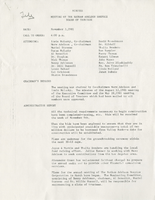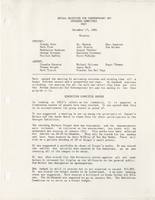Search the Special Collections and Archives Portal
Search Results

Transcript from interview with Rabbi Yocheved Mintz by Barbara Tabach, March 11, 2015
Date
Archival Collection
Description
During this oral history, Rabbi Yocheved Mintz weaves the journey of her life before and during her move to Las Vegas. She recalls thinking the "whole world was Jewish" growing up in Cleveland, Ohio, and discusses finding a community in Las Vegas, and becoming a rabbi in 2004.
Yocheved (nee Porath) Mintz is a native of Cleveland, Ohio, where she grew up surrounded by Jewish tradition and teachings. Her grandfather was Rabbi Israel Porath and inspiration to become the family?s first female rabbi. She was ordained in May 2004. The next year she became the second spiritual leader of Valley Outreach Synagogue, now known as P?nai Tikvah. She soon was known as a tireless and inspirational rabbi for the entire Jewish community of Las Vegas. After eleven years, on June 17-18, 2016, Rabbi Mintz?s life and dedication to being Jewish were celebrated. She transitioned to be Rabbi Emerita/Senior Educator. Before moving from Chicago to Las Vegas in 1999 she was abundantly busy with raising four sons she had with her husband the late Dr. Alan Mintz (1938-2007). However, she also managed to pursue her education, become an interior designer, and co-found with her friend Etty Dolgin, a Jewish education consulting firm called Kesher Team. Yet there was a lingering goal to become a rabbi. Throughout her life, Yocheved eagerly studied various approaches to living a Jewish life. So once she had settled into Las Vegas, she began her commute to Los Angeles to study at the Academy for Jewish Religion, a trans-denominational seminary. She interned at Temple Beth Sholom and has been involved in Jewish education locally and nationally. She has served as the first president of the Las Vegas Board of Rabbis and on the Interfaith Council of Southern Nevada.
Text
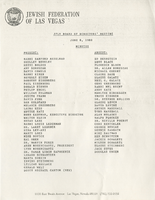
Jewish Federation correspondence, meeting minutes, and other records, item 19
Description
Jewish Federation of Las Vegas (JFLV) Board of Directors' Meeting minutes, June 8, 1988.
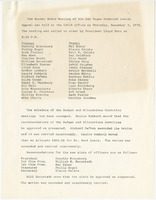

Transcript of interview with Florence McClure by Joanne Goodwin, January 24, 1996 & February 6, 1996
Date
Archival Collection
Description
Florence McClure came to Las Vegas later in her life, but the state felt her presence and the community her contributions as if she were a native daughter. Introduced to the League of Women Voters in 1967, McClure met her political mentor Jean Ford and learned how to practice the core elements of democracy. She put those tools to work in a number of ways, however her participation in the creation of the Rape Crises Center and her advocacy for locating the women’s prison near Las Vegas are two of her long-lasting efforts. Florence Alberta Schilling was born in southern Illinois where she enjoyed the security of a tight-knit family and the independence to test her abilities growing up. She graduated from high school and attended the MacMurray College for Women at Jacksonville. With the attack on Pearl Harbor in 1941, she began a series of jobs working for the war effort. She moved to Ypsilanti, Michigan with a girlfriend to work at the Willow Run Army Airbase and then moved to Miami, Florida where she worked for the Provost Marshall in the Security and Intelligence Division. She met her husband, James McClure, at the time and they married in 1945. During the next several years, they raised a family and moved around the country and to Japan with the military. McClure came to Las Vegas in 1966 as part of her work in the hotel industry which she engaged in after her husband’s retirement from the military. She had worked in California and Miami Beach, but it was Burton Cohen in Los Angeles who invited her to join him in a move to Las Vegas to build the new Frontier Hotel and Casino. Following the completion of the Frontier, she moved to the Desert Inn with Cohen in 1967 and worked as the executive office manager. After a few years, she decided to leave the industry and complete her college education. She graduated from UNLV in 1971with a BA in Sociology with an emphasis on criminology. She was 50 years old. McClure had been a member of the League of Women Voters for a few years at that point and had learned the political process from Jean Ford and workshops on lobbying. She had numerous skills that were waiting to be tapped when she attended an informational meeting on the incidence of rape in the Las Vegas valley. From that meeting, a small group of individuals, including McClure, began the organization Community Action Against Rape (later renamed the Rape Crisis Center) in 1973. It was the first agency in the area devoted to serving individuals who had been assaulted and changing the laws on rape. The organization’s first office was set up in McClure’s home. Over the next decade, she worked to change attitudes and reshape policy by constantly raising the issues of sexual assault with police officers, emergency room doctors, judges, and legislators. Her role as an advocate took her into hospital emergency rooms and courtrooms to assist victims. It also took her to the state legislator to lobby repeatedly for a change in laws. During this period, journalist Jan Seagrave gave McClure the nickname “Hurricane Florence” - a fitting moniker that captured the force with which McClure attacked the issue. As a result of her efforts and those of the people with whom she worked, we now 1) recognize rape as a crime of assault; 2) forbid the sexual history of a rape victim from being used against her in court; and 3) recognize marital rape. In addition to learning about Florence McClure’s activities, the reader of this interview will gain information on the role of civic organizations like the League of Women Voters in engaging the voluntary efforts of women in the post-war years.
Text
Southern Nevada Chapter of the American War Mothers Organization Records
Identifier
Abstract
The Southern Nevada Chapter of the American War Mothers Organization Records (1947-1995) are comprised primarily of scrapbooks containing correspondence and minutes, numerous newspaper clippings, and photographs. Also included are pamphlets on American War Mothers organizational rituals, bylaws, history, ceremonial ephemera, flags, and a Henderson Chapter Charter. The materials also contain items relating to the North Las Vegas Chapter, the Rose Garden Chapter, and the State Chapter.
Archival Collection
Charles P. Squires Photograph Collection
Identifier
Abstract
The Squires Family Photographs document the Squires Family and the development of the Las Vegas Valley in Nevada from approximately 1860 to 1980, with a bulk of the photographs depicting people and events from 1900 to 1950. The photographs depict the Euro-American settlement and growth of Las Vegas, Nevada; traveling and exploration of Southern Nevada and the Southwestern United States; the Hoover (Boulder) Dam and the Colorado River; clubs and social groups; and the Squires Family, especially prominent newspaper editor and publisher Charles Pember (C. P. or “Pop”) Squires, Delphine “Mom” Anderson Squires, and their children.
Archival Collection
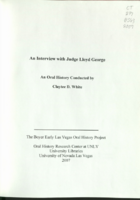
Transcript of interview with Judge Lloyd D. George by Claytee D. White, June 15, 2005
Date
Archival Collection
Description
Text

Gabriel Garcia oral history interview: transcript
Date
Archival Collection
Description
Oral history interview with Gabriel Garcia conducted by Monserrath Hernandez and Barbara Tabach on November 13, 2019 for the Latinx Voices of Southern Nevada Oral History Project. In this interview, Garcia discusses his early life in Arizona and moving to Las Vegas, Nevada in 1984. He remembers attending a sixth grade center, the Pacific Engineering and Production Company of Nevada (PEPCON) explosion, and attending Las Vegas High School. Garcia talks about Mexican culture in Las Vegas, car clubs, and becoming a graphic designer. Lastly, Garcia discusses his involvement with the Association of Latino Professionals for America, and the idea of diversifying the professional workplace.
Text

